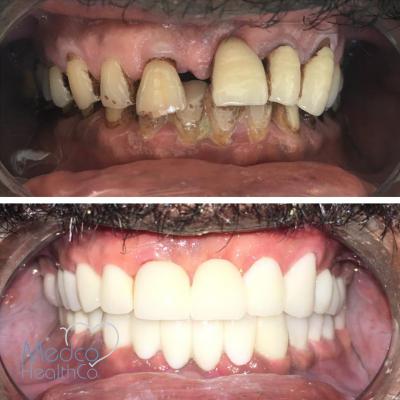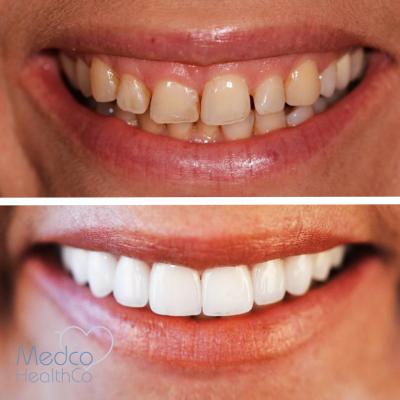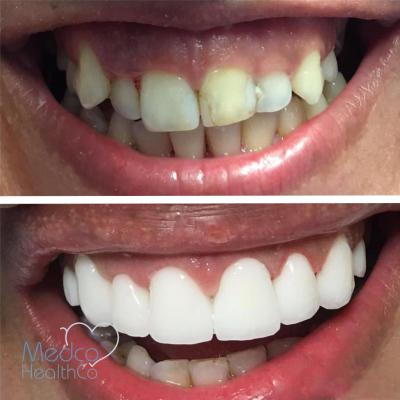DENTAL VENEERS SUPPORT PACKAGE
DENTAL VENEERS SUPPORT PACKAGE
(Dental Travel Coordination – Informational Only)
Dental Veneers Aesthetic Dental Support
At Medco HealthCo, we coordinate dental veneer support packages for international patients seeking smile enhancement and improved dental aesthetics as part of a structured dental travel experience in Istanbul.
Our role is to manage the dental travel and coordination process — including consultation scheduling, clinic arrangements, accommodation, transfers, and on-site assistance — in collaboration with licensed dental professionals at accredited clinics.
Medco HealthCo does not provide dental advice, diagnosis, or treatment.
WHAT THIS OPTION FOCUSES ON
Dental veneers are often explored by individuals aiming to enhance the appearance, shape, and overall harmony of their smile as part of a personalised aesthetic journey.
All dental explanations, material options, suitability assessments, and service planning are handled directly by licensed dental professionals during consultations arranged at partner clinics.
Medco HealthCo does not assess dental eligibility or recommend specific veneer types.
SERVICE SCHEDULE
(Coordination Overview)
A typical coordination plan may include:
-
Day 1: Arrival in Istanbul
-
Initial dental consultation may be arranged depending on arrival time
-
-
Following Days:
-
Scheduled dental clinic visits as planned
-
On-site coordination and assistance
-
-
Final Day:
-
Completion of planned visits
-
Departure planning and coordination
-
Exact timing and number of visits are confirmed individually during the planning process.
WHAT’S INCLUDED IN THE DENTAL VENEERS SUPPORT PACKAGE
Depending on personal planning, coordination services may include:
-
Airport pickup and farewell transfers
-
Coordination of dental clinic appointments
-
Accommodation arrangements
-
Translation support during clinic visits
-
Dedicated on-site assistance
-
Post-visit coordination support after return home
All inclusions are clearly outlined prior to confirmation.
PRICING & PAYMENT INFORMATION
Pricing is provided individually, based on the services coordinated.
LAMINATE VENEER SUPPORT PACKAGE
(Dental Travel Coordination – Informational Only)
Laminate Veneer Aesthetic Dental Support
At Medco HealthCo, we coordinate laminate veneer support packages for international patients seeking refined smile enhancement as part of a structured dental travel experience in Istanbul.
Our role is to manage the dental travel and coordination process — including consultation scheduling, clinic arrangements, accommodation, transfers, and on-site assistance — in collaboration with licensed dental professionals at accredited clinics.
Medco HealthCo does not provide dental advice, diagnosis, or treatment.
WHAT THIS OPTION FOCUSES ON
Laminate veneer options are often explored by individuals aiming to enhance the appearance, balance, and overall harmony of their smile as part of a personalised aesthetic journey.
All dental explanations, suitability assessments, and service planning are handled directly by licensed dental professionals during consultations arranged at partner clinics.
Medco HealthCo does not assess dental eligibility or recommend specific veneer types.
SERVICE SCHEDULE
(Coordination Overview)
A typical coordination plan may include:
-
Day 1: Arrival in Istanbul
-
Initial dental consultation may be arranged depending on arrival time
-
-
Following Days:
-
Scheduled dental clinic visits as planned
-
On-site coordination and assistance
-
-
Final Day:
-
Completion of planned visits
-
Departure planning and coordination
-
Exact timing and number of visits are confirmed individually during the planning process.
WHAT’S INCLUDED IN THE LAMINATE VENEER SUPPORT PACKAGE
Depending on personal planning, coordination services may include:
-
Airport pickup and farewell transfers
-
Coordination of dental clinic appointments
-
Accommodation arrangements
-
Translation support during clinic visits
-
Dedicated on-site assistance
-
Post-visit coordination support after return home
All inclusions are clearly outlined prior to confirmation.
PRICING & PAYMENT INFORMATION
Pricing is provided individually, based on the services coordinated.
EMPRESS VENEER SUPPORT PACKAGE
(Dental Travel Coordination – Informational Only)
Empress Veneer Aesthetic Dental Support
At Medco HealthCo, we coordinate Empress veneer support packages for international patients seeking refined smile enhancement as part of a structured dental travel experience in Istanbul.
Our role is to manage the dental travel and coordination process — including consultation scheduling, clinic arrangements, accommodation, transfers, and on-site assistance — in collaboration with licensed dental professionals at accredited clinics.
Medco HealthCo does not provide dental advice, diagnosis, or treatment.
WHAT THIS OPTION FOCUSES ON
Empress veneer options are often explored by individuals aiming to enhance the overall appearance, balance, and aesthetics of their smile as part of a personalised cosmetic journey.
All dental explanations, material discussions, suitability assessments, and service planning are handled directly by licensed dental professionals during consultations arranged at partner clinics.
Medco HealthCo does not assess dental eligibility or recommend specific veneer types.
SERVICE SCHEDULE
(Coordination Overview)
A typical coordination plan may include:
-
Day 1: Arrival in Istanbul
-
Initial dental consultation may be arranged depending on arrival time
-
-
Following Days:
-
Scheduled dental clinic visits as planned
-
On-site coordination and assistance
-
-
Final Day:
-
Completion of planned visits
-
Departure planning and coordination
-
Exact timing and number of visits are confirmed individually during the planning process.
WHAT’S INCLUDED IN THE EMPRESS VENEER SUPPORT PACKAGE
Depending on personal planning, coordination services may include:
-
Airport pickup and farewell transfers
-
Coordination of dental clinic appointments
-
Accommodation arrangements
-
Translation support during clinic visits
-
Dedicated on-site assistance
-
Post-visit coordination support after return home
All inclusions are clearly outlined prior to confirmation.
PRICING & PAYMENT INFORMATION
Pricing is provided individually, based on the services coordinated.





